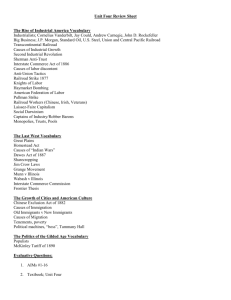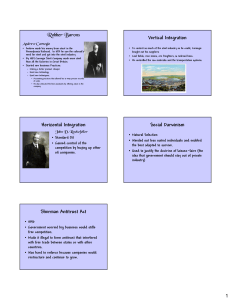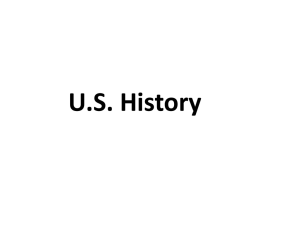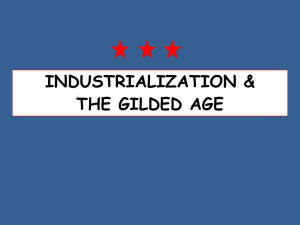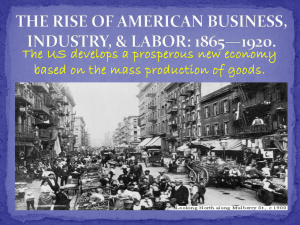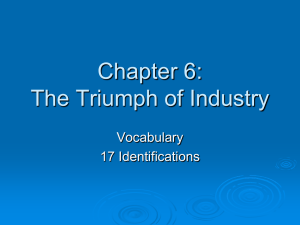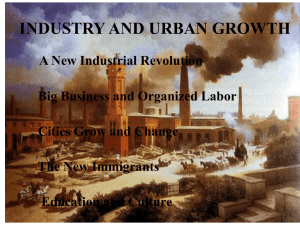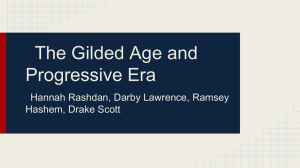Gilded Age Notes
advertisement
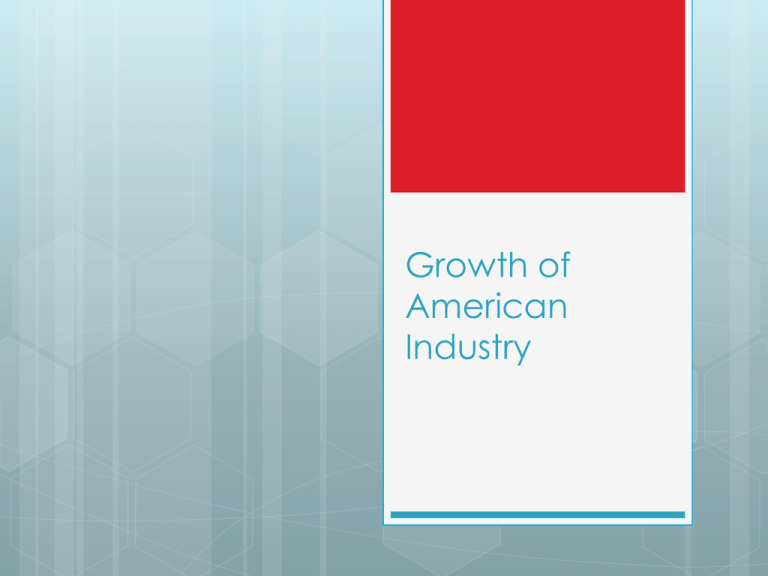
Growth of American Industry Creating the Railroad Large outburst of rail construction after Civil War Costly business endeavor that required government subsidies Railroads were granted land in square mile intervals along route Towns grew and died with the railroad Spanning the Continent Would help bolster the Union (How?) Union Pacific RR builds westward Govt paid for it by the mile (Problems?) Irish immigrants provide labor/defense from Indian attacks “Hell on wheels” – tent towns filled with alcohol & prostitutes Central Pacific RR build eastward Same govt incentives, Chinese labor Binding the Country by Rail 4 other Transcontinental RR’s built by 1900 No govt subsidies but generous amounts of land James Hill – “Greatest Railroad Builder”? Prosperity of railroad depended on prosperity of area it served Many companies went bankrupt Tracks led “from nothing to nowhwere” Railroad Consolidation New York Central line consolidated eastern railways Cornelius Vanderbilt Superior service at lower rates Two major improvements Steel replaces iron tracks Standard gauge of track width Westinghouse Cars airbrake, Pullman Palace Revolution by Railways Rail connection creates national market for goods Foreign & domestic investors profit Stimulated industrialization and agriculture RR companies attracted immigrants Could transport them wherever they wanted to go Timezones Carried raw materials and finished goods Took farmers to new land Shift from local times to 4 time zones Creates the first millionaires (not based on land holdings) Corruption in Railroad Companies Credit Mobilier Gould & Fisk vs Vanderbilt “Stock watering” Public interest ignored Bribery of politicians Government Actions Against Railroad Farmers wondered if US went from “slave power” to “money power” Public favored laissez faire “spirit of capitalism” Grange – agrarian group that pushed legislative changes Supreme Court – Wabash Case: states could not regulate interstate commerce Interstate Commerce Act 1887 Interstate Commerce Commission Stabilized system but didn’t change it Began series of regulatory agencies Miracles of Mechanization Postwar expansion makes America largest manufacturing nation American Ingenuity Mass production Typewriter, refrigerator car, electric railway Telephone & switchboard operators Thomas Edison Phonograph, mimeograph, moving picture, light bulb Trust Titans Andrew Carnegie – steel John D. Rockefeller – oil J.P. Morgan – banking Vertical integration Own all means of production from resource to finished good More efficient to control every step of production Horizontal integration Own all the companies that create a certain good Buy out your competitors Steel Steel held together the young nation Produced 1/3 of world’s supply Dominance of heavy industry Capital goods instead of consumer goods Bessemer process created cheap, strong steel America was one of few places that had coal, iron ore and labor supply to make steel. Men of Steel Andrew Hard work, taking responsibilities, smooth talking business owners Eliminates middle-men JP Carnegie Morgan Financed reorganization of railroads, insurance, and banks Bought out Carnegie for $400 million Rockefeller & Oil Kerosene helps oil industry grow Automobile leads to growth Beats out steam & electric car Rockefeller flourished in free market Signals decline of whaling and growth of night life Controlled 95% of oil refineries Used spies, forced railroads to pay him Antitrust crusaders were old money trying to preserve past wealth. Gospel of Wealth Carnegie coined the term in response to squandered fortunes of those around him Rockefeller was devoutly religious, believed in proving moral worth Wealthy must give back to the community as a sign of gratitude for their wealth Others believed because they worked to gain fortune other could too (those who didn’t were lazy) Government Tackle Trusts Public mobilizes against monopolies Sherman Anti-Trust Act 1890 Forbids combinations of companies based on size, not based on their effect on free market 1. 2. What obstacle does Carnegie run into and what substance allows Carnegie to solve the problem? Who is Henry Frick and what does he provide for Carnegie? Southern Industry By 1900 the South still had not recovered to pre-Civil War industrial levels Plantation system gave way to sharecropping system Machine-made cigarette gave region a boost Tobacco industry took off James Duke: American Tobacco Company Richard J Reynolds: Reynolds Tobacco Southern Industry Region remained rural despite industrialist attempts Preferential rates given to Northern goods Southern raw materials received preference; kept South in 3rd world status Birmingham, AL could be major steel town, Pittsburgh PA lobbied to prevent this South turns to cotton Cotton mills built, textiles save the South Impact of New Industrial Revolution in America Economic miracles bring wealth, higher standard of living No longer nation of farmers Life dictated by factory clock instead of nature Women’s roles change Dependence on wages brings pros and cons American goods find worldwide market Strength in Unions Laborers ran machines for faceless companies Directors were concerned with pleasing stockholders, not workers New machines killed & created jobs Immigrant labor worked for cheap Worker unionize Companies have the advantage Scabs, thugs to break strikes ironclad oaths, yellow-dog contracts, company towns Debt similar to sharecropping Labor Unions 1872 – 32 national unions Many excluded women and minorities (like most of society) Knights of Labor Welcomed nearly all workers Pushed for economic/social reform, not political Haymarket Square episode After numerous strikes, violence erupts in Chicago Bomb kills dozens, public mistakenly connects Knights with the anarchists Inclusion of all workers backfired American Federation of Labor (1886) Samuel Gompers, President Collection of national self-governing unions Pushed for “closed-shop” or all union workplace Public slowly began to accept unions Pullman Strike (1894) George Pullman invented sleeping car Panic of 1893 forces layoff of 3000 workers Eugene V Debs – American Railway Union ARU stops letting Pullman cars travel, creates bottleneck in Chicago Richard Olney urges President Clevland to help Owners attach mail cars to Pullman cars Strikers are thus interfering with the mail Troops called in to stop strike, 30 workers killed Agrarian Reform Prices fall from 1830’s to 1900 Technological advances make harvesting wheat much quicker Outmoded way of life Isolated from urban life Political bosses act in interest of urban citizens Imperialism leads to lower prices Dependent on the availability of railroads The Grange Patrons Kelley Helped to keep farmers up to date on tech changes Panics led to growth in membership Gained of Husbandry – Oliver Hudson control in some state legislatures MS & OH River’s Populist Party strongest in the Rockies, the Great Plains, and the South weakest in areas where the Grange is the strongest unwilling to appeal to blacks Some major campaign planks direct election of Senator elimination of national banks currency inflation - increased supply free and unlimited coinage of silver graduated income tax Political Issues in 1890’s Sherman Anti-trust Act passed 1890 the silver issue in value led the amount of silver in a dollar to be worth more than a dollar to manufacturers thus the coining of silver is discontinued in 1873 - “Crime of 73” Bland-Allison Act - 1878 - the government agrees to purchase $2-4m dollars worth per month Panic of 1893 causes a run on gold government attempted to keep $100m in reserve reserves of 190m in 1890 dwindled to 100m in 1893 by 1894 they fell to 41m and there was fear that the U.S. would be forced off the gold standard Cleveland sought repeal of the Sherman Silver Purchase Act succeeded - caused great bitterness within the party Election of 1896 William McKinley (R) vs William Jennings Bryan (D) “Cross of Gold” speech by Bryan Populists support Bryan as best option Bryan can’t sustain early momentum, McKinley wins easily Gold Standard Act of 1900 - redemption of paper currency in gold only return of prosperity Immigration New immigration v old immigration old immigrants - northern and western Europe (Ireland, Germany, England) new immigrants southern and eastern Europe (Italy, Russia, Poland) negative reasons for immigration - four scourges poverty militarism (wars, social unrest, conscription) religious persecution political tyranny positive factors for immigration opportunities associated with economic growth propaganda from steamship and railroad companies recruitments by industry glowing accounts of earlier immigrants Differences in Immigrants by Location NW Europe similar language bases similar customs relatively wealthy similar governmental structure higher rate of literacy similar religions (mostly Protestant SE Europe Different languages Different customs Mostly from poverty Restrictions on Immigration American Protective Association Immigration Restriction League Reasons Labor unions favored immigrants Immigrants favored Democratic Party Racism Formal restrictions based on criminal history, morals, race, literacy test, quotas Jim Crow Laws Southern Democratic governments enact laws to prevent social mobility of black citizens Booker T Washington Attempt to restore old order from before Civil War Emphasis on economic equality ahead of social/political Tuskegee Institute W.E.B. Du Bois – Niagra Movement (leads to NAACP) Full citizenship Classical education for “talented tenth”

